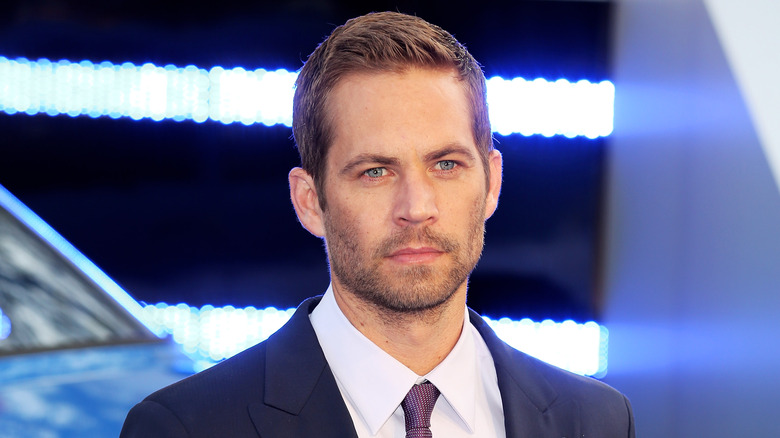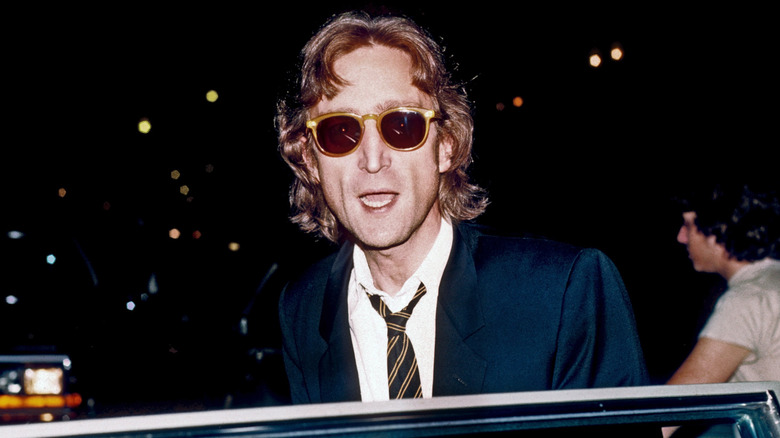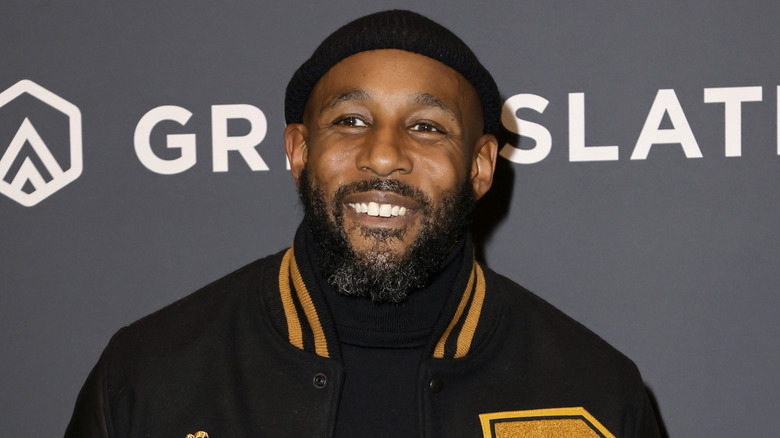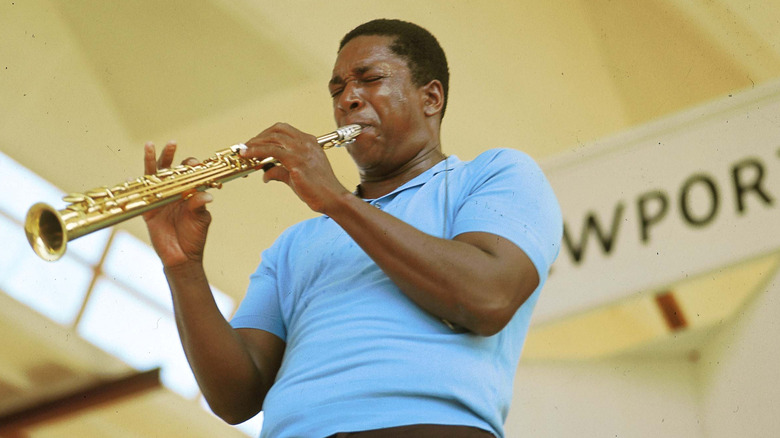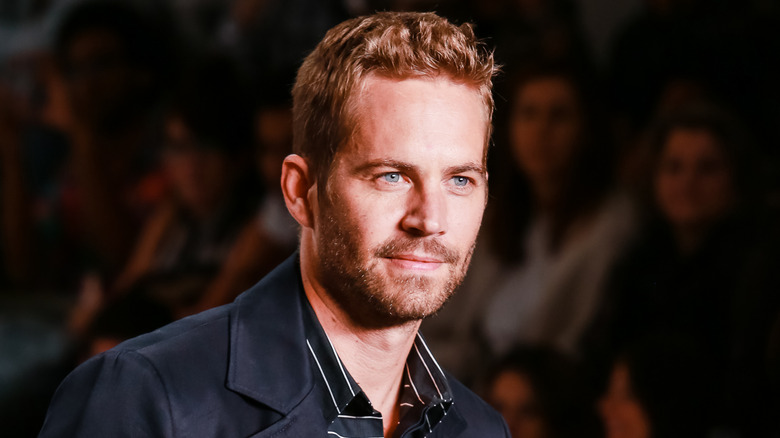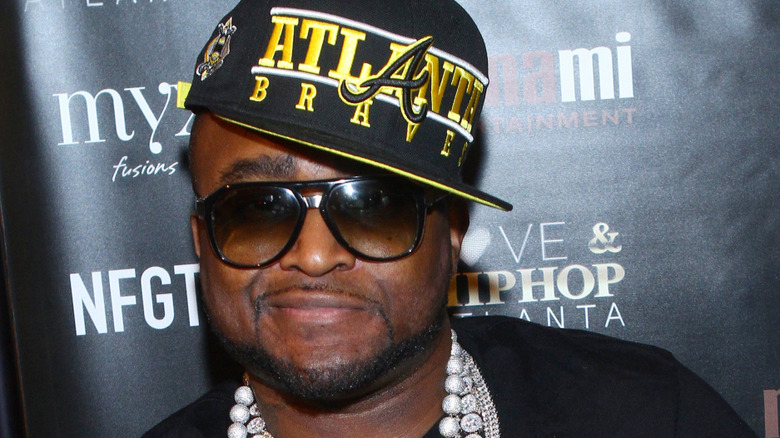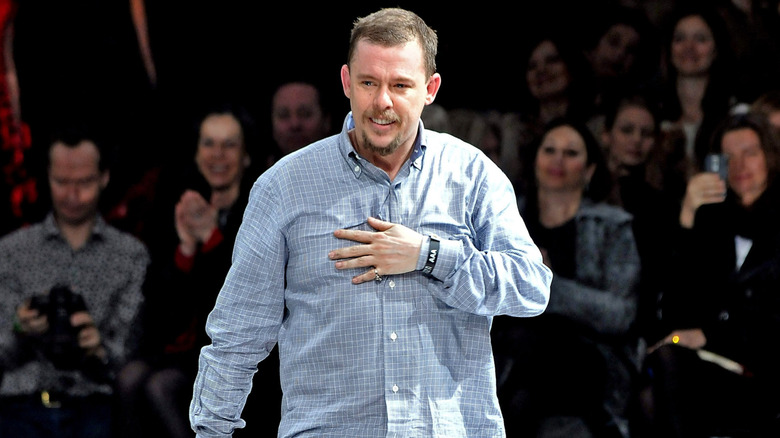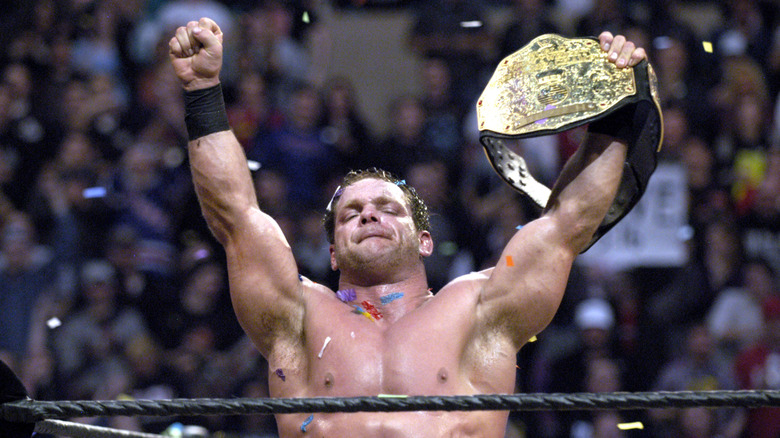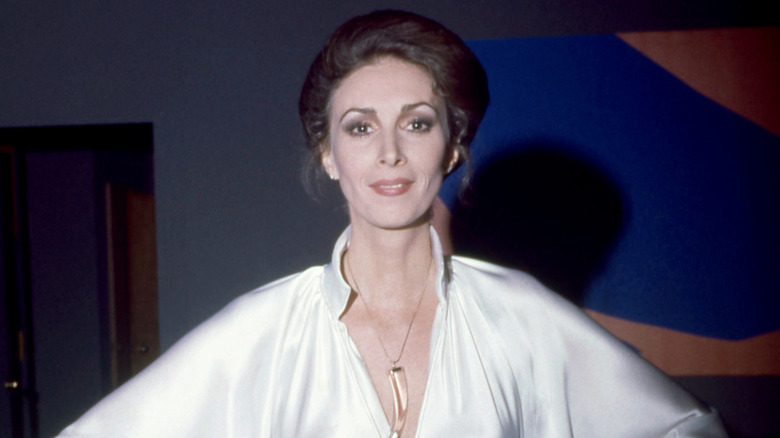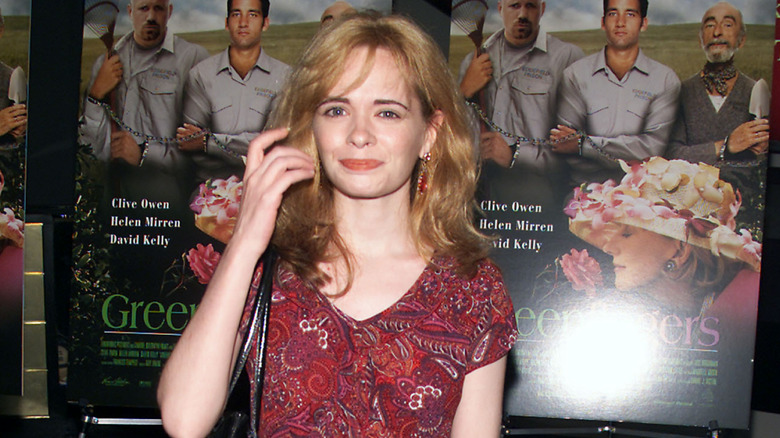Celebrities Who Sadly Passed Away At Just 40 Years Old
This article contains mentions of suicide, murder, and violence.
When celebrity stories end suddenly, it's always a surreal feeling. Especially since the worlds of entertainment, sports, and fashion to which they belong have forever kept fans engaged and intrigued. In a stroke of coincidence, many such icons happened to be a perfect 40 years of age when they died. At the time of their untimely deaths, they were still deemed to be in the prime of their lives, achieving new milestones and shaping their industries in ways that continue to be felt even today.
Some losses were sudden and shocking, like the car crash that claimed the life of Paul Walker, whose success as a star ironically hinged on speed racing, thanks to the "Fast & Furious" series. Others were mired in unimaginable violence, such as the murder-suicide case of wrestler Chris Benoit. Yet others suffered from mental or physical health conditions they could not revive from. Some of these deaths happened decades ago, long before many of us were even around. But no matter the cause or timelines that define them, each of these celebrity deaths at 40 left behind a lingering sense of regret among audiences over the talent and boundary-pushing work they had yet to explore.
John Lennon
John Lennon's death in 1980 was a catastrophic event, not just for the music world that lost a once-in-a-generation voice, but for his millions of fans who believed in the musician's message of peace and love. The former Beatles frontman was shot and killed at the age of 40 on December 8 as he returned home to the Dakota apartment building in New York which he shared with his wife, Yoko Ono. The assassination sent shockwaves across the globe, prompting an outpouring of vigils and tributes that mourned the violent loss of one of the world's foremost cultural icons.
The circumstances surrounding the incident only magnified the haunting feel of Lennon's death as details surrounding his murder came to light. John Lennon, during his final hours, had interacted with his assassin, Mark David Chapman. An obsessive Lennon super-fan, Chapman had waited outside the Dakota for hours that same day in hopes of getting his copy of Lennon's new album "Double Fantasy" signed.
Lennon obliged, unaware that he was giving an autograph to the man who would return later that night with a gun and mark his end. Eerily enough, this notorious exchange was captured on camera and a photo of Lennon giving his future killer an autograph exists today. The "Imagine" hitmaker sustained multiple gunshot wounds and couldn't survive. Chapman, meanwhile, hung around the crime scene reading "The Catcher in the Rye" — the book which, he said, had inspired the murder — until police arrived to arrest him.
Stephen 'tWitch' Boss
Stephen "tWitch" Boss was the very personification of light and joy for fans who knew him as the ever-smiling DJ on "The Ellen DeGeneres Show." But his influence as an entertainer went far beyond his longtime stint on the popular talk show; he was a dancer, actor, choreographer, and producer all rolled into one. Though his time as DeGeneres' trusty sidekick dominated much of his later legacy, Boss first rose to prominence on the fourth season of "So You Think You Can Dance," where not just his hip-hopping abilities but his affable personality turned him into an immediate audience favorite. After earning a runners-up place on the show, Boss propelled his career forward across industries, becoming a recognizable (and beloved) face in entertainment.
Against the context of his seemingly full life, news of Stephen "tWitch" Boss' death in 2022 came as a devastating blow. The 40-year-old was found unresponsive in a motel room in Encino, California, not far from his home, with reports saying that he had died by suicide from a self-inflicted gunshot wound. Many struggled to reconcile Boss' cheerful public image with the circumstances of his death, which fueled countless conspiracy theories and speculative narratives online. Boss' widow Allison Holker, meanwhile, came out in public to reiterate the significance of her husband's passing as a profound moment of reflection about mental health. As she told People, "It's important for me to share the truth to make things easier for someone else."
Caroline Flack
Caroline Flack was a household name across millions of homes in Britain, lighting up television screens for years as the host of "Love Island" and "The X Factor." However, the tragedy of Flack's life was that her personal affairs were as public as her camera-facing job was. She had grappled with mental health issues for years, sometimes to suicidal degrees that kept her family on edge. "She was quite fascinated by the subject of suicide always," her sister said in a Channel 4 television documentary about the host. "So it's something that's in my life that I'm prepared could happen." She was also notoriously unreceptive to criticism about her work or public responses at large, which made the circumstances of her death even more troubling.
In 2019, a year before her death, Flack was charged with assaulting her then-boyfriend Lewis Burton in an alleged incident of domestic dispute. It put Britain's beloved television presenter at the center of a media storm that was unrelenting in its pursuit of the innermost, often sensational, details of the episode. From scornful headlines to bloody pictures and upsetting accusations, Flack was surrounded by frenzied tabloid attention that likely affected her already fragile mental state. On February 15, 2020, as she awaited a trial in the assault case, Flack was found dead in her London home from an apparent suicide. Her death sent shockwaves through Britain and beyond, sparking a global conversation on media ethics and online bullying.
John Coltrane
John Coltrane's death in 1967 hit the jazz world like a thunderbolt. One of the most influential and important musicians of the 20th-century, the sax king had lived with poor health and a concerning diagnosis of liver cancer during his final weeks, eventually passing away in a Long Island hospital. At the time, and even now, Coltrane's musical legacy was unquantifiable. His approach to the saxophone was revolutionary, blending both emotional and technical depth that few others in the genre had been able to match then. The late 1950s were when he burst resoundingly onto America's jazz scene, finding distinction with his unique "sheets of sound" technique that defined his playing style and frequent associations with jazz legend Miles Davis.
Coltrane's professional life was only turning more profound near the end of his life. But as far as the lifestyle that came with his celebrity was concerned, the story was far more complex. While liver cancer was listed as the cause of his death at 40, discussions around Coltrane's drug addition indicates a more complex picture.
Coltrane had been a heroin user for part of his career, which some accounts claim created health conditions that contributed to his eventual early death. A paper in the Canadian Journal of Gastroenterology and Hepatology, which explores the prevalence of cirrhosis in the jazz world, also explored the theory, while mentioning that Coltrane died of hepatitis B and hepatocellular carcinoma.
Paul Walker
When Paul Walker died in 2013, the entertainment world stopped in its tracks. At just 40, one of Hollywood's brightest stars met his end in a way that felt too surreally ironic. The "Fast & Furious" actor — whose celebrity had become synonymous with speed and cars owing to his longtime association with the film franchise — was killed in a high-speed crash on November 30 in California. He was attending a charity event for his organization Reach Out Worldwide, when he got into a Porsche with his friend and professional racer Roger Rodas. Moments later, tragedy struck when Rodas, who was behind the wheel, lost control of the car and crashed into a lamppost and some trees in the neighborhood of Valencia.
Paul Walker's disturbing autopsy report detailed that the car had been going at about 100 mph and upon impact, burst into flames and killed both men on the spot. The aftermath of the tragedy was a heady mix of immeasurable grief, global tributes, and the Walker family's legal entanglements with Porsche over a wrongful death lawsuit. While the latter was settled, it could not ease the loss the world felt with Walker's passing. The star had been in the process of filming "Fast & Furious 7" when he died — a gap the franchise managed to cover with support from his similar-looking brothers, CGI, tweaks in the script, and an emotional final scene that served as a fitting tribute to Walker.
Shawty Lo
Shawty Lo was one of the most defining voices of Atlanta's hip-hop community. Born Carlos Rico Walker, the rapper and D4L founder had been a fixture in the city's music scene since the early 2000s and was credited with helping shape the sound of Southern trap that influenced a whole generation of artists. With foot-tapping hits like "Laffy Taffy" and "Dey Know," his music quickly earned him a loyal fan base and turned him into both a local legend and a national name. Unfortunately, his life came to an abrupt end in September 2016 when he died in a car crash at the age of 40.
Shawty Lo was driving on the Atlanta Interstate 285 when his vehicle veered off the road and beyond the guardrails, and went up in flames after a hard collision into some trees. He died on the scene while two women who were in the car with him managed to escape with injuries.
According to The Atlanta Journal-Constitution, authorities allowed the survivors to leave with a large amount of cash that Shawty Lo had on him at the time of his death. Despite a life marked by drugs and legal troubles, the rapper had apparently built up a local reputation as a good samaritan. As Bishop Dreyfus C. Smith said at his funeral, "Shawty Lo paid rent for people that didn't pay him back, put food on people's table that would have been hungry ... Some earned it, some was just hanging on."
Alexander McQueen
Alexander McQueen's death in 2010 served as a grim reminder that success does not always guarantee happiness. At just 40 years old, the mold-breaking British designer, whose namesake fashion label had been redefining the industry since the '90s, was found dead in his London home following suicide. The loss sent shockwaves across the world — not simply because McQueen had established himself as one of the foremost authorities on fashion, but also because his bold designs often challenged the norms of high couture and pushed the boundary on what dressing up could mean. That he was one of the British royal family's favorite designers was perhaps a good measure of just how influential McQueen was.
Behind the high glamor lifestyle he symbolized, McQueen lived an often troubled personal life. His mental health had been disturbed for years, to the extent that McQueen had attempted to overdose on drugs on multiple occasions. His mother's death, just days before his own, apparently served as a catalyst in pushing him beyond the edge he had been standing on. Authorities found that McQueen had ingested a dangerous mix of drugs like cocaine and sleeping pills before hanging himself to death. "He was very close to his mother. I think on top of the grief he felt there was that one link that had gone from his life and there was very little to live for," Dr. Stephen Pereira, a medical consultant of McQueen's, said at the time (via The Guardian).
Chris Benoit
The story of Chris Benoit is perhaps one of the most tragic yet intriguing to come out of the pro-wrestling world. A true beast in the ring and a world champion beloved by fans, Benoit — or "The Crippler" as he was called — had built up a legacy over his two-decade career that few sportsmen in the arena could match. Decorated as he was, in the end, all of Benoit's WWE and WCW distinctions and accolades came to be overshadowed by the final, violent night of his life. During a nightmarish weekend in June 2007, Benoit took the lives of his wife Nancy and their 7-year-old son Daniel before dying by suicide himself.
The Benoit double-murder and suicide, as this case that seemed straight out of a Hollywood thriller came to be known, left the whole world shellshocked. Nancy was killed first, with Benoit reportedly strangling her to death on June 22. A day later, Daniel was suffocated, with reports later showing that the child was sedated prior to being murdered. That Benoit left Bibles near his family members' dead bodies emerged as one of the most notoriously chilling details from the saga. After this rampage, Benoit hung himself in his home gym. While the precise motive behind this gory incident is disputed, medical tests later revealed that Benoit's brain was profoundly damaged and concussed from the severities of his sport, with one researcher likening it to an aged Alzheimer patient's brain (via ABC News).
Wilhelmina Cooper
March 1980 marked the end of one of the most blazing careers in fashion, with the tragic death of Wilhelmina Cooper. The Dutch model was only 40 when she died of lung cancer, having also battled a pneumonia diagnosis during the final year of her life. Known for her statuesque frame and striking cheekbones, Cooper had been an unstoppable force at the peak of her fame in the 1960s and '70s. It would not be a stretch to say that she defined what it meant to be a supermodel by a large measure, before the advent of the '90s supermodels who popularized the term. In fact, her record of appearing on over 300 Vogue covers was deemed unbeatable for generations. "Her 'look' was 'the look' of the time," according to Jerry Ford of Ford Models (via The Washington Post).
Beloved as she was by the industry for being one of fashion's most unique models, Cooper, in her personal life, was known to have struggled with her body image and would often follow very severe diets. As she told a journalist for Pittsburgh Post-Gazette, she considered herself "the heaviest model" of her time, despite having weighed 159 pounds when she kickstarted her career. "I could appear slim by the way I posed, but I became determined to lose weight, and I simply began to starve myself," she once said.
Adrienne Shelly
In what played out as one of the most horrific crimes witnessed by the entertainment industry, Adrienne Shelly was murdered in 2006 at her office in Manhattan's Greenwich Village. The star, whose roles in "The Unbelievable Truth" and "Trust" made an indelible mark in the indie film world and established herself as an actor worth her salt, was 40 at the time of the tragic incident. Her death was initially believed to have been a suicide, with Shelly's body discovered hanging from a shower rod in the bathroom. Her husband Andy Ostroy — with whom she shared one child — was, however, not convinced and pushed for a deeper investigation into his wife's death. It also strengthened his case that certain things at the scene of Shelly's death, such as missing money and stray footprints, cast doubt on the suicide angle.
As authorities inspected Shelly's death, they managed to zero in on a suspect named Diego Pillco, a 19-year-old construction worker who had been trying to rob her office. Shelly had reportedly walked in on the burglary and confronted Pillco, who killed her and staged her death to look like a suicide. The outpouring of grief was immense, especially considering that Shelly's life had appeared blissfully complete with a happy family, a thriving career, and immeasurable talent. She had branched out from acting into other film avenues like writing and direction, with milestones like "I'll Take You There" and the posthumously released "Waitress" decorating her ouevre.
If you or someone you know is struggling or in crisis, help is available. Call or text 988 or chat 988lifeline.org
